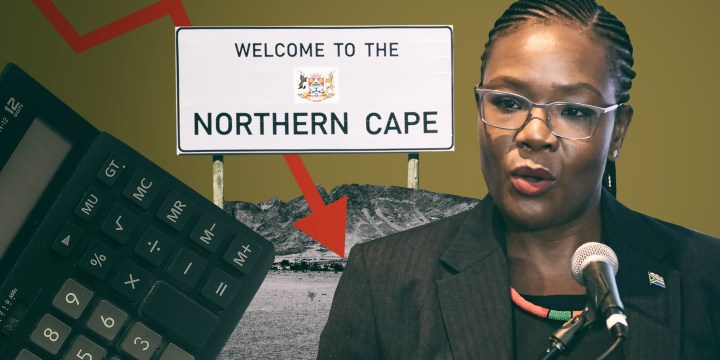AUDIT OUTCOMES
Auditor-General slams Northern Cape municipalities’ ‘inability to manage their resources’

The Auditor-General has called on leaders in the Northern Cape to ‘honestly and thoroughly reflect’ on the effort they have put in to improve the province’s municipalities.
‘The lives of the people in the Northern Cape are negatively affected by municipalities’ inability to properly manage the resources under their control, and only a concerted effort will take local government forward,” said Auditor-General (AG) Tsakani Maluleke.
The AG made this finding in the 2021/22 consolidated general report on the local government audit outcomes, released on Wednesday, 30 May.
Read more in Daily Maverick: Local government litany of woe — municipal decay and its dire consequences for service delivery
“In our previous general report, we stated that the weak control environment at municipalities contributed to the poor audit outcomes over the term of the previous administration, which also negatively affected service delivery.
“The slow response by both political and administrative leadership to our findings and recommendations to improve this situation continued into 2021/22, resulting in the overall audit outcomes regressing even further,” read the AG’s report, in the notes specific to the Northern Cape.
In 2021/22, four municipalities in the province received a clean bill of health, in comparison to five in 2020/21. John Taolo Gaetsewe District Municipality, in Kuruman, lost its clean audit standing, backsliding to an unqualified with findings audit outcome in the latest reporting period.
It lost its clean audit ranking “because it did not properly monitor its internal controls, resulting in a material finding on compliance with legislation”, according to the AG report.
The four municipalities in the Northern Cape that received a clean audit are:
- Frances Baard District;
- Namakwa District;
- ZF Mgcawu District; and
- Hantam Local Municipality.
There have been minimal changes in the audit outcomes for Northern Cape municipalities from 2020/21 to 2021/22. The only municipality which improved its audit outcomes (from a qualified audit opinion to an unqualified opinion with findings) was Gamagara Local Municipality, in the John Taolo Gaetsewe District. According to the AG report, this was achieved by filling vacancies and addressing audit findings raised in the previous year.
Ga-Segonyana Local Municipality — also in the John Taolo Gaetsewe District — regressed from an unqualified audit opinion with findings, to a qualified opinion “because management did not monitor and adequately review the financial statements prepared by consultants”.
The AG is considering issuing a material irregularity on the use of consultants at the municipality.
Additionally, the AG remains concerned about the quality of financial reporting in the province — with 76% of municipalities submitting poor-quality financial statements for auditing.
In 2021/22, municipalities in the Northern Cape spent R126.95-million on financial reporting consultants — up from R110.05-million in 2020/21.
More than half of the municipalities were “financially distressed”, according to the AG, with 16 municipalities disclosing material uncertainty about their financial sustainability.
Municipalities with disclaimed opinions
Four of the municipalities received disclaimed opinions — the worst audit opinion a municipality can receive. To make matters worse, all four municipalities are repeat disclaimers.
The four municipalities which received disclaimed opinions, and the number of years they have held that ranking are:
- !Kheis (five years);
- Joe Morolong (seven years);
- Kgatelopele (two years); and
- Renosterberg (five years).
In 2021/22, the office of the AG enhanced its audit work on Joe Morolong, !Kheis and Renosterberg, and found that these municipalities “had made little-to-no progress on infrastructure projects due to cash-flow difficulties and poor project management”.
“These municipalities either did not set or did not achieve key service delivery targets relating to infrastructure maintenance. Their infrastructure was also not properly secured, resulting in vandalism and theft,” read the report.
The AG found that these municipalities spent less than 1% of the value of their infrastructure assets on repairs and maintenance.
“To effectively deliver services to communities, these municipalities need to prioritise protecting municipal infrastructure, developing maintenance plans, and adequately budgeting for and spending on maintenance in line with accepted norms.
“Replacing dilapidated or vandalised infrastructure is expensive, putting further pressure on municipal resources, and can be avoided if municipalities take reasonable steps to protect and maintain their assets. To properly respond to this risk, the municipalities will need to cooperate with other spheres of government, such as the provincial roads and public works department and the South African Police Service, as well as non-government bodies such as community forums and neighbourhood watches.”
The lack of infrastructure maintenance led municipalities to rack up water distribution losses of R210.03-million — representing 43% of all water purchased, according to the report.
“The failing infrastructure, as evident in pothole-riddled roads across the province and dilapidated water and sanitation treatment plants, is likely to result in significant harm to the general public,” read the report.
The AG referred to the spillage of sewage caused by pumps that were not working at the Gogga pump station in the ANC-run Sol Plaatje Local Municipality. DM


















This article is of no use to me unless I am told which political party or parties are in charge of these municipalities. Surely that is the most fundamental information an informed citizen requires? Or are you deliberately withholding that information because of a particular agenda?
Can’t see the point of this article without knowing who’s in charge of the municipalities and the detailed reasons for their bad reports.